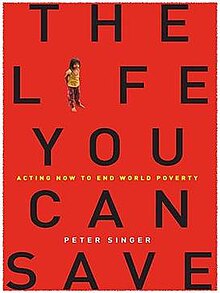The Life You Can Save
 |
|
| Author | Peter Singer |
|---|---|
| Country | United States |
| Language | English |
| Subject | Poverty, Charity (practice), Humanitarianism |
| Publisher | Random House |
|
Publication date
|
2009 |
| Media type | Print (Hardcover) |
| ISBN | |
| OCLC | 2008036279 |
| LC Class | HV48.S56 2009 |
| Preceded by | The Ethics of What We Eat |
| Followed by | The Most Good You Can Do: How Effective Altruism Is Changing Ideas About Living Ethically |
The Life You Can Save: Acting Now to End World Poverty is a 2009 book by Australian philosopher Peter Singer. The author argues that citizens of affluent nations are behaving immorally if they do not act to end the poverty they know to exist in developing nations.
The book is focused on giving to charity, and discusses philosophical considerations, describes practical and psychological obstacles to giving, and lists available resources for prospective donors (e.g. charity evaluators). Singer concludes the book by proposing a minimum ethical standard of giving.
Singer presents the following argument in the book:
Singer argues that it is obvious that an adult ought to save a child from drowning unless that individual is risking something as valuable as the child's life. Singer points out that as many as 27,000 children die every day from poverty that could be easily and cheaply helped by existing charities (see also List of preventable causes of death).
Singer says that many of his readers enjoy at least one luxury that is less valuable than a child's life. He says his readers ought to sacrifice such a luxury (e.g. bottled waters) and send proceeds to charity, if they can find a reliable charity.
Singer spends time clarifying that people have a right to spend money any way they want, but says that fact does not change the way one ought to spend it. The author also notes that some people may be indifferent to the impact they could have, but says this consideration also fails to change how people ought to act.
Singer's central thesis is that, a given individual may be able to point to others doing nothing, but that individual still ought to do as much as they can. The title of the book comes from the fact that Singer addresses readers directly, asking them what they will do about "the life you can save".
Singer says that citizens of richer nations do not donate as much as they could. The author says the reasons are not philosophical, but due to psychological considerations including cognitive dissonance, diffusion of responsibility and the evolutionary history of human ancestors. For instance, according to Singer, cognitive dissonance theory predicts that humans are rationalizing creatures, making it difficult to change their minds on topics (e.g. charity) that cause any anxiety — unless they are highly motivated to bear it during long contemplation.
Singer contends that humans are highly capable of establishing social circles where giving is the norm, and he offers Bill Gates's "Giving Pledge" as an example. Singer expresses the hope that an entire culture of giving can develop, allowing individuals to fully admit to themselves how selfish certain individuals have become with their money. The author compares individuals like Paul Farmer (a physician that the author describes as making many sacrifices) with billionaire Paul Allen (who, Singer says, spent $200 million to build the Octopus — a 413-foot personal yacht that requires a crew of sixty).
...
Wikipedia
